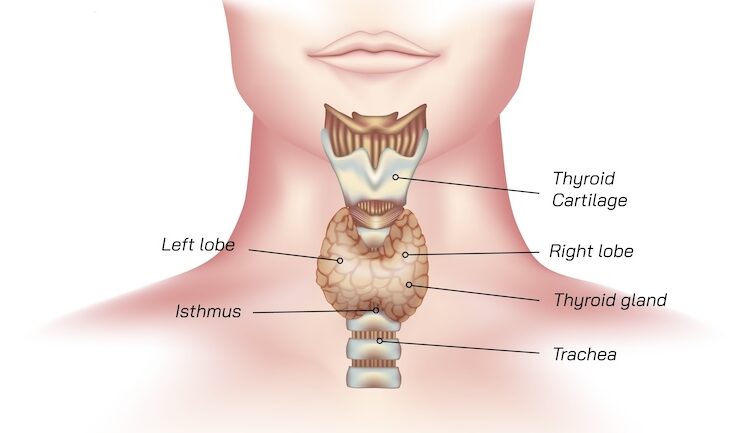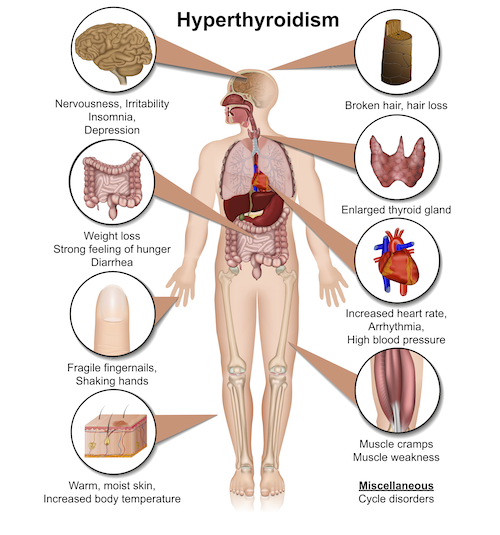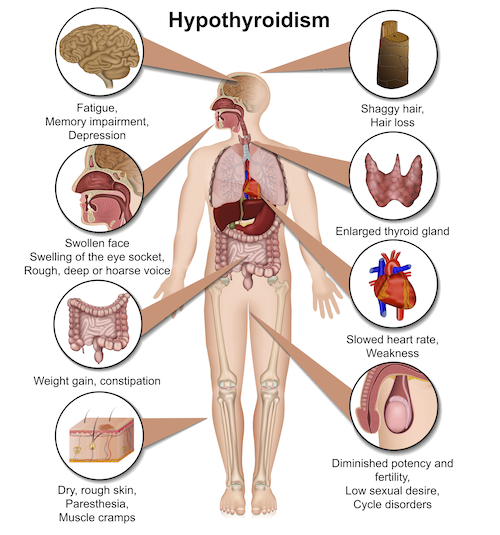If you have changes in heart rate, energy level, skin and hair texture, bowel movements, and mood, there is a chance you have a thyroid condition. More than one out of ten people in the U.S. experiences thyroid problems, and women are more likely to have a thyroid condition than men.
Do you think you may have a thyroid problem? Keep reading for signs and symptoms of common thyroid conditions, hyperthyroidism, and hypothyroidism, as well as more information about other thyroid problems.
WHAT IS A THYROID?
The thyroid gland is an integral part of the endocrine system. This butterfly-shaped organ regulates important hormones that influence many functions in your body.
These hormones also affect how well your body performs physically and mentally. So, if you’re feeling unwell with no explanation, your body might be showing signs of a thyroid problem.

SYMPTOMS OF THYROID CONDITIONS
OVERACTIVE THYROID (HYPERTHYROIDISM) SYMPTOMS
- Nervousness and anxiousness
- Difficulty concentrating
- Increased heart rate and dizziness
- Increased sweating
- Heat intolerance
- Increased appetite
- Weight loss (or sometimes weight gain)
- More bowel movements
- Goiter (enlarged thyroid gland)
- Weak nails
- Thinning hair
- Sensitive skin and skin discoloration
- Difficulty Sleeping
- Fatigue
- Restlessness
- Lighter or irregular periods (in females)
UNDERACTIVE THYROID (HYPOTHYROIDISM) SYMPTOMS
- Fatigue
- Sensitivity to cold
- Constipation
- Dry and itchy skin
- Changes in hair, nails, and skin
- Hair loss
- Weight gain
- Slower heart rate
- Muscle weakness
- Muscle aches, pains, and soreness
- Joint pain, stiffness, and swelling
- Puffiness in the face
- Hoarse voice
- Heavy or irregular periods (in females)
- Depression
- Brain fog and memory problems
RISK FACTORS
Remember that your body is a complicated and intricate, interwoven system. However, over time, many factors can build up and disrupt the balance of your body. Specifically, your endocrine system, which includes your thyroid gland, can become overactive or underactive to compensate for or respond to these factors. Those with a family history of thyroid disorders are especially at risk.
Other risk factors include:
- mismanaged stress
- smoking
- high exposure to lithium and iodine (likely from medications)
- thyroid injury or trauma
- nutrient deficiency (especially iodine, zinc, and selenium).
- female at birth
- 60 or older
Thyroid function problems, in particular, occur when the thyroid either becomes under or overused. These conditions are called hypothyroidism and hyperthyroidism, respectively. Both of these conditions can cause several problems. Thankfully, thyroid conditions are treatable with both non-surgical and surgical treatments.
To explore twenty signs of thyroid problems and possible treatments, our Nashville surgeons have divided them into ten signs for hyperthyroidism and hypothyroidism.
10 Hyperthyroidism Symptoms
As we mentioned, hyperthyroidism comes from an overactive thyroid gland. When this happens, your body produces an excess of thyroid hormones, such as triiodothyronine (T3) and thyroxine (T4). T4 is specifically produced when the pituitary gland secretes the thyroid-stimulating hormone (TSH). Here are the signs that your thyroid is off when it has abnormally high levels of thyroid hormones.
1. Nervousness and Anxiousness
When your thyroid gland works overtime, the hormones tell the body to work in overdrive. As you’ll see, this leads to several symptoms that can make you feel nervous and anxious. But before that, these hormones lead to mood swings and hyperactive thoughts.
2. Increased Heart Rate (Plus Palpitations)
Next, as one of the physical symptoms of high hormone levels, your heart rate increases. The increase in heart activity can also lead to heart palpitations. Increased heart rate and palpitations can lead to dizziness and lightheadedness. So, if you feel your heart is off or moving too fast, you should ask your doctor about investigating your thyroid health.
3. Increased Sweating
Because the thyroid hormones tell your body to become more active, naturally, it will try to cool itself off by sweating, even in less active situations when you’re not physically exerting yourself.
4. Unintentional Weight Loss
Depending on where you are in life, this may not be unwanted. But, the abundance of thyroid hormones will increase your metabolism and appetite. While you may welcome a little unexplained weight loss, unexpected weight loss can lead to dramatic and unwanted changes. However, sudden weight loss can also indicate other conditions.

5. More Bowel Movements
The changes in hormone levels can even influence your digestive system. More frequent bowel movements can indicate other conditions, such as Crohn’s disease; however, hyperthyroidism can even cause rapidly changing patterns.
6. Goiter
A goiter occurs when the thyroid gland begins to swell due to the overproduction of hormones. Typically, the thyroid needs adequate levels of iodine. However, if you don’t have enough iodine, your body will try to compensate for what’s missing, and the thyroid swells. A goiter can form with one nodule or several nodules, and this is known as a multinodular goiter.
If you develop a goiter, you must take iodine supplements and possibly consider surgery. It is worth noting that a multinodular goiter may require more extensive treatment than a single nodule goiter. If you have been diagnosed with a multinodular goiter, your doctor will likely recommend monitoring the size of the nodules over time to ensure that they are not growing too large.
Symptoms of a goiter include:
- a tight feeling around your throat
- hoarseness
- coughing
- trouble swallowing
Hashimoto’s thyroiditis often causes goiters. This condition is an autoimmune disorder that affects millions of Americans. Specifically, this disorder causes inflammation and damage to the thyroid. As a result, the body tries to compensate by causing the thyroid gland to grow.
Hashimoto’s disease can also lead to symptoms of hypothyroidism.
7. Weak Nails and Thinning Hair
Your hair and nails are constantly growing. This is because a critical function of the thyroid gland is sending hormone signals to trigger hair and nail growth. With hyperthyroidism, the extra hormones tell your body to increase the growth of your hair follicles and nails in a shorter time.
While it would seem that rapid nail growth would be a positive side effect of thyroid dysfunction, that isn’t the case. This forced growth is too fast. As a result, your body has to stretch its natural resources, which can lead to thin and brittle hair and nails.
8. Sensitive Skin and Skin Discoloration
Thyroid hormones also influence the quality of your skin in various ways. For example, with hyperthyroidism, you may notice itchy and dry patches of skin.
Your face may feel softer and swollen. You may even notice swelling around your fingertips. Other symptoms include skin darkening, rashes, lumps, and reddish spots.
9. Difficulty Sleeping
You may find sleeping difficult with more hormones telling your body to be active. For instance, hormonal changes can make your nervous system hyperactive. Therefore, you may notice difficulty sleeping by no fault of your own. Also, as we’ve discussed, you may experience nervousness and anxiety as symptoms of thyroid problems, which also affect sleep.
10. Changes in Menstrual Periods
This last one is a thyroid symptom in women only. Because hyperthyroidism tells your body to move faster, the menstrual cycle can become lighter and shorter. You may also notice the time between your periods increasing.
On their own, these symptoms may indicate other medical problems. However, when you or your doctor identify more than one of these symptoms at a time, there is a good chance it’s due to thyroid problems.
Thankfully, most thyroid disorders are treatable and are not life-threatening. However, you should call your doctor immediately if you notice a rapid heart rate and experience a fever or deliriousness. These are signs of a hyperthyroid complication called a thyrotoxic crisis.
Additional Symptoms
Symptoms of thyroid problems will vary from person to person. It’s important to see a doctor for a proper diagnosis if you believe you have several of these symptoms. Additionally, here are more symptoms of hyperthyroidism to look out for:
- High blood pressure
- Itchy or clammy skin
- Nausea, vomiting, or diarrhea
- Feeling faint with sudden movement
- Skin redness or rashes
- Weak hips or shoulders
- Shaking hands
- Swelling around the eyes or protruding eyes
What Complications Can Arise from Untreated Hyperthyroidism?
Untreated hyperthyroidism can lead to a variety of serious health issues:
- Heart Problems: Untreated hyperthyroidism can result in heart conditions such as atrial fibrillation, which is an irregular, often rapid heart rate that can increase the risk of stroke and other heart-related complications.
- Stroke: Due to the potential for atrial fibrillation, individuals with untreated hyperthyroidism are at a higher risk of suffering from a stroke.
- Heart Failure: Another significant complication is congestive heart failure, where the heart is unable to pump blood effectively, leading to fatigue, shortness of breath, and fluid retention.
- Bone Health Issues: This condition can also impact bone density, leading to osteoporosis. Osteoporosis makes bones weak and brittle, increasing the risk of fractures.
Addressing hyperthyroidism with proper medical treatment is crucial to avoid these severe complications. Regular check-ups and adherence to prescribed therapies can help manage the condition and maintain overall health.
10 Hypothyroidism Symptoms
Now that we’ve covered the signs of an overactive thyroid let’s look at what happens with an underactive thyroid gland, also known as hypothyroidism.
1. Fatigue
First, when you develop hypothyroidism, your body produces fewer thyroid hormones, making it harder to recover from day-to-day stress. As a result, you’ll start feeling tired more often and more frequently. However, it may also be difficult to fall asleep. It also becomes more challenging for your body to get moving each day. Your thoughts become more sluggish and slow, and you may have difficulty concentrating as mental fatigue, or brain fog, sets in.
2. Sensitivity to Cold
The hormones secreted by your thyroid gland also regulate your body’s temperature. With fewer hormones, your body has more difficulty heating itself because your metabolism slows down. Therefore, you’ll feel more sensitive to the winter cold.

3. Constipation
While hyperthyroidism speeds up your digestive process, hypothyroidism slows it down. Constipation often occurs as a result of these slowed processes. If you notice days pass without a bowel movement, you should talk to your doctor.
4. Dry and Itchy Skin
Just as the overproduction of thyroid hormones leads to skin problems, the lack of these hormones also impacts your skin’s health. The skin tends to become dry, itchy, scaly, and may even wrinkle or pale. These symptoms can also cause other skin conditions.
5. Weight Gain
Thyroid imblances cause your metabolism to slow down significantly. As a result, your body begins burning less energy and consequently stores more fat. It can even be hard to exercise because of the fatigue that comes with hypothyroidism.
6. Muscle Weakness and Slow Heart Rate
Without the stimulation from thyroid hormones, your muscles begin to lose their strength and even atrophy or become permanently relaxed. Our heart uses muscle tissue to function, so without stimulation, you may experience a slower heart rate, high blood pressure, high cholesterol levels, and swelling.
7. Muscle Aches, Pains, and Soreness
Similarly, your muscles can feel sore, tired, and heavy. As symptoms of hypothyroid myopathy, this shows as an early, underlying thyroid condition where lower levels of thyroid hormones affect muscle metabolism. Also, with a lower metabolism, your body uses catabolism to create energy. Catabolism is a biological process involving the breakdown of complex molecules into simpler ones. Catabolism of muscle tissue leads to the breakdown of muscle proteins, resulting in muscle weakness, soreness, and pain.
8. Joint Pain, Stiffness, and Swelling
Catabolism, known as “destructive metabolism,” also affects the joints, contributing to fatigue, aches, and pains.
9. Heavy or Irregular Periods
Some of the thyroid symptoms in women specifically are changes to the menstrual cycle. In contrast to hyperthyroidism, hypothyroidism causes menstrual blood flow to become slower and heavier. Cycles can also become less frequent. Hypothyroidism also causes excess prolactin, which can prevent ovulation. Too much of the hormone prolactin can make it difficult to become pregnant.
10. Depression and Brain Fog
Finally, your nervous system slows down because your body can’t use energy as efficiently. Combined with the feelings of fatigue, you can feel sluggish, experience mood swings, and see signs of depression. Over half of people with hypothyroidism experience depression. Though, patients who receive hormone replacement therapy usually report improvement in depressive symptoms.
What Complications Can Arise from Untreated Hypothyroidism?
Untreated hypothyroidism can lead to several serious health issues. Firstly, it can significantly affect mental well-being, potentially causing mood disorders such as depression. Additionally, there is a considerable risk of developing peripheral neuropathy, which involves nerve damage leading to pain and numbness in the extremities.
Untreated hypothyroidism also poses a threat to cardiovascular health, increasing the likelihood of heart disease and heart failure. Furthermore, it can negatively impact reproductive health, sometimes resulting in infertility.
In severe cases, unchecked hypothyroidism can lead to a life-threatening condition known as myxedema coma. This rare, but critical, complication involves severe hypothyroidism and requires immediate medical attention.
CAN YOU HAVE BOTH HYPOTHYROIDISM AND HYPERTHYROIDISM?
Certain medical conditions can lead to both hypothyroidism and hyperthyroidism at different stages. Two primary conditions that exemplify this are:
- Thyroiditis
- This involves inflammation of the thyroid gland.
- It often begins with a phase of hyperthyroidism (overactive thyroid) and transitions to hypothyroidism (underactive thyroid), which can be either temporary or chronic.
- Postpartum Thyroiditis
- This condition affects some individuals after pregnancy.
- Approximately 5% of new parents experience this within the first year after giving birth.
- It generally starts with a period of hyperthyroidism, followed by hypothyroidism, and is usually temporary.
Both conditions showcase the dynamic nature of thyroid disorders, where the gland can swing from producing too much hormone to too little, often puzzling both patients and healthcare providers. Understanding these conditions can help manage symptoms more effectively and seek timely medical advice.
POTENTIAL CAUSES
What causes thyroid problems? If you experience any of these thyroid symptoms, it’s important to know what risk factors you may have that can lead to these conditions. The causes of thyroid conditions can vary depending on the type, but some common risk factors are associated with them. Risk factors may include:
- Gender: Thyroid disorders, particularly autoimmune ones like Hashimoto’s thyroiditis and Graves’ disease, are more common in women than in men. Women are at greater risk, especially during pregnancy and menopause.
- Age: The risk of thyroid complications increases with age. Hypothyroidism, in particular, becomes more common as people get older.
- Family History: A family history of thyroid disorders, especially autoimmune thyroid diseases, can significantly increase the risk. There appears to be a genetic component to these conditions.
- Previous Thyroid Conditions: If you’ve had thyroid issues in the past, you may be at a higher risk of developing them again or experiencing related complications.
- Radiation Exposure: Exposure to high levels of ionizing radiation, such as radiation therapy for head and neck cancer or nuclear accidents, can damage the thyroid gland and increase the risk of thyroid cancer or other thyroid disorders.
- Iodine Intake: Both inadequate and excessive iodine intake can be risk factors for your thyroid health. In regions with iodine deficiency, hypothyroidism is more common. Furthermore, restrictive diets and plant-based diets can be deficient in iodine, leading to hypothyroidism. Conversely, excessive iodine intake (iodine-induced hyperthyroidism) can lead to thyroid complications.
- Certain Medications: Medications, such as lithium, interferon, and amiodarone, can affect thyroid function and increase the risk of thyroid problems. Also, some over-the-counter weight loss supplements contain thyroid hormones, which can lead to thyroid imbalances over time.
- Pregnancy and Childbirth: Pregnancy-related hormonal changes can sometimes lead to temporary thyroid problems, such as gestational hypothyroidism or hyperthyroidism. Additionally, women who have had postpartum thyroiditis are at a higher risk of developing permanent thyroid disorders later in life.
- Autoimmune Diseases: Having other autoimmune diseases, such as type 1 diabetes or rheumatoid arthritis, can increase the risk of developing autoimmune thyroid conditions.
- Smoking: Smoking has been linked to an increased risk of thyroid eye disease in individuals with Graves’ disease.
- Obesity: Obesity has been associated with an increased risk of hypothyroidism, as excess body fat can affect the conversion of thyroid hormones in the body.
- Stress: Chronic stress may contribute to thyroid difficulties, particularly by disrupting the hypothalamic-pituitary-thyroid (HPT) axis, which regulates thyroid function.
DIAGNOSING A THYROID CONDITION
Know that having one or more risk factors doesn’t necessarily mean you will develop a thyroid problem. Thyroid disorders are complex and can be influenced by a combination of genetic, environmental, and hormonal factors. If you have concerns about your thyroid health or specific risk factors, please discuss them with a healthcare professional who can assess your individual situation with a physical exam and by discussing all your symptoms. Then they can provide accurate guidance on monitoring and managing thyroid health.
To diagnose a thyroid condition, your healthcare provider will conduct tests, such as:
- Blood tests to assess thyroid hormone levels: These tests can determine whether you have hypothyroidism or hyperthyroidism by measuring thyroid-stimulating hormone (TSH), T3, T4, and thyroid antibodies.
- Physical exam: Your healthcare provider will look for physical signs of thyroid issues, such as an enlarged thyroid gland (goiter).
- Imaging tests, such as a thyroid scan: Imaging techniques, like a thyroid ultrasound, help your provider identify nodules (lumps) and/or goiter. Nuclear medicine imaging, such as a thyroid uptake and scan, can indicate whether nodules are overactive.

By combining these tests, your healthcare provider can accurately diagnose your thyroid condition and develop the most effective treatment plan.
CAN THYROID DISEASE BE PREVENTED?
Most thyroid diseases can’t be prevented because they are often rooted in genetic predispositions and autoimmune conditions. These underlying factors are beyond our control.
However, there are specific thyroid issues related to iodine levels that might be preventable. Here’s what you can do:
- Maintain Balanced Iodine Levels: Both too much and too little iodine can cause thyroid complications. Ensure you’re consuming the right amount by monitoring your diet.
- Diet and Supplements: If concerned about iodine intake, consult with a healthcare provider. They can recommend dietary adjustments or supplements if necessary.
- Regular Check-Ups: Routine health screenings can detect early thyroid anomalies. Early intervention might prevent complications.
While genetics and autoimmune conditions are unpreventable, being mindful of iodine intake and maintaining regular health check-ups can help manage potential thyroid issues.
How to Treat Thyroid Problems
Now that you know more about the problems that can indicate thyroid disorders, what should you do? Of course, the first thing you should do is ask your doctor about your symptoms. They will run tests and ask you about your symptoms and medical history to determine if you may have a thyroid problem. Once they determine if you have a thyroid disorder, and which thyroid disorder you have, they will come up with a treatment plan specific to your condition. The goal of treatment is to manage your thyroid hormone levels to get them to a healthy range.
For hyperthyroidism, potential treatment options include:
- Antithyroid medications (methimazole and propylthiouracil): These drugs work by inhibiting the production of thyroid hormones.
- Radioiodine therapy: This involves using radioactive iodine to damage the thyroid cells, which reduces the production of excessive thyroid hormones.
- Beta-blockers: While these medications don’t directly impact thyroid hormone production, they help control symptoms such as a rapid heart rate.
- Surgery (thyroidectomy): For a more definitive solution, your healthcare provider might recommend removing the thyroid gland surgically. This stops hormone production, but you’ll need to take synthetic thyroid replacement hormones for the rest of your life.
For hypothyroidism, the primary treatment involves thyroid hormone replacement therapy. This typically includes taking synthetic thyroid hormones, such as levothyroxine, to replenish the hormone levels in your body.
Usually, treatments include hormone replacement therapy. Additionally, your doctor may prescribe iodine supplements to treat goiters.
However, if your symptoms are severe, it can be a sign of thyroid cancer, which will likely require surgery and more aggressive treatments.
List of Thyroid Disorders
If you are experiencing several of the symptoms listed above at a time, you most likely have a thyroid condition. Below is a list of possible thyroid disorders you may have. Of course, only a proper diagnosis can come from a healthcare professional.
- Hyperthyroidism: Hyperthyroidism occurs when the thyroid gland produces excessive amounts of thyroid hormones, causing an acceleration of metabolic processes. Graves’ disease is the most common cause of hyperthyroidism and is also an autoimmune disorder.
- Hypothyroidism: Hypothyroidism occurs when the thyroid gland doesn’t produce enough thyroid hormones. This leads to a slowing down of the body’s metabolic processes. Common causes of hypothyroidism include Hashimoto’s thyroiditis (an autoimmune disease) and iodine deficiency.
- Hashimoto’s Thyroiditis: Thyroiditis is inflammation of the thyroid gland. It can be caused by viral or bacterial infections, autoimmune conditions, or other factors. Hashimoto’s Thyroiditis, or Hashimoto’s Disease, is a common cause of hypothyroidism where the immune system mistakenly attacks the thyroid gland. This is an autoimmune disorder where immune system cells gradually destroy the thyroid gland’s hormone-producing cells. Some of the common symptoms of Hashimoto’s disease include fatigue, cold intolerance or sensitivity, constipation, muscle weakness, thyroid swelling, dry skin, hair loss, and depression.
- Graves’ Disease: Graves’ disease is an autoimmune disorder that involves the overactivity of the thyroid gland, resulting in hyperthyroidism. With Graves’ Disease, the immune system mistakenly produces antibodies called thyroid-stimulating immunoglobulins (TSIs) or thyroid-stimulating hormone receptor antibodies (TSHR antibodies). These antibodies mimic the action of thyroid-stimulating hormone (TSH) and attach to receptors on the thyroid gland, leading to excessive production of thyroid hormones. A few common Graves’ Disease symptoms include eye problems such as puffy or bulging eyes, tremors, weight loss, anxiety, heat sensitivity, excessive sweating, low sex drive, and irregular heartbeat.
- Goiter: A goiter is the enlargement of the thyroid gland, often caused by iodine deficiency, Hashimoto’s thyroiditis, Graves’ disease, or other conditions.
- Thyroid Tumors: Thyroid tumors are lumps or growths in the thyroid gland. Most tumor nodules are noncancerous (benign), but some can be cancerous. Thyroid nodules can cause symptoms if they become large or if they produce excess hormones.
- Thyroid Cancer: Thyroid cancer is a relatively rare but often treatable form of cancer. It can develop from thyroid nodules. The most common types of thyroid cancer include papillary, follicular, medullary, and anaplastic thyroid cancer.
- Postpartum Thyroiditis: Postpartum thyroiditis is a condition that occurs in some women in the months following childbirth. It involves inflammation of the thyroid gland and can lead to temporary thyroid dysfunction. The exact cause of postpartum thyroiditis is not well understood, but it is thought to be related to the postpartum hormonal changes and the immune system’s response to these changes in susceptible individuals.
- Congenital Hypothyroidism: Congenital hypothyroidism is a condition in which the thyroid gland is underdeveloped or absent at birth, leading to low levels of thyroid hormones in the body.
Before you start receiving treatments, you’ll need to work with your doctor to get tested. Typically this will include blood tests to check the levels of T4 and T3 in your blood. Your doctor will help you know what to do when the tests return.
Usually, treatments include hormone replacement therapy. Additionally, your doctor may prescribe Iodine supplements to treat goiters.
However, if your symptoms are severe, it can be a sign of thyroid cancer.
What Causes Thyroid Cancer?
As mentioned, thyroid cancer can develop from thyroid nodules. However, thyroid nodules are very common with most of them benign.
Thyroid cancer can develop with DNA changes and abnormal thyroid cell multiplication.
It’s worth noting that women are three times more likely to develop thyroid cancer.
Thyroid cancer does not include symptoms early on, but If you notice any unusual lumps ensure to get it checked out with your doctor.
Lifestyle Changes
In addition to medications, supplements, and other prescribed treatments, your physician may recommend lifestyle adjustments to manage symptoms further and treat the underlying cause of your thyroid condition.
Most importantly, remember to manage your stress levels. Regular exercise and a healthy diet are well-known remedies for stress, as they work together to regulate hormone levels and release endorphins.
However, certain foods may trigger thyroid inflammation, so be mindful of how your body reacts to different foods and note any adverse reactions. Common trigger foods include gluten, processed foods, dairy, and certain vegetables. These trigger foods vary from person to person, but use a food diary to pinpoint which foods cause irritation and inflammation for you.
Not only should you cut out certain foods that cause a bad reaction, but you should introduce foods high in vitamins and nutrients in which you may be deficient. Try iodine and selenium-rich foods like seaweed, Brazil nuts, and fish. Let your doctor know about any significant changes to your diet so they can monitor your health.
Thyroid Surgeons in Nashville & Middle TN
If you and your doctor decide that surgery is needed, visit The Surgical Clinic. We have many providers in Nashville, Smyrna, and throughout Middle Tennessee who can give you the care you need. In addition, our board-certified surgeons are highly trained individuals with many years of experience.
You can meet our surgeons, who offer thyroid and parathyroid surgery, and Dr. Taylor, who performs scarless surgery.
Call us, and schedule a consultation with a healthcare professional today. Thyroid awareness month is in January, and this event helps many Americans identify a thyroid condition they have been enduring. Our surgeons in Tennessee can screen you for thyroid problems you may suspect and if you are at risk of developing thyroid diseases.
Request an Appointment To Screen Your Thyroid
General surgeons in Greater Nashville

Dr. John Boskind
General Surgeon
SUMMIT

Dr. Mark Cooper
General Surgeon
NASHVILLE

Dr. Patrick Davis
General Surgeon
SOUTHERN HILLS

Dr. Alex Fruin
General Surgeon
SUMMIT

Dr. Mark Hinson
General Surgeon
COLUMBIA

Dr. George Lynch
General Surgeon
NASHVILLE

Dr. Clinton Marlar
General Surgeon
SKYLINE

Dr. James McDowell
General Surgeon
NASHVILLE

Dr. Willie Melvin
General Surgeon
SMYRNA

Dr. Chad Moss
General Surgeon
COLUMBIA

Dr. William Polk
General Surgeon
NASHVILLE

Dr. Drew Reynolds
General Surgeon
ST. THOMAS WEST

Dr. Joshua Taylor
General Surgeon
SMYRNA

Dr. Davidson Oxley
General
COLUMBIA

Dr. Tyson Thomas
General Surgeon
ST. THOMAS WEST

Dr. John Valentine
General Surgeon
HENDERSONVILLE

Dr. Patrick Wolf
General Surgeon
ST. THOMAS WOLF

